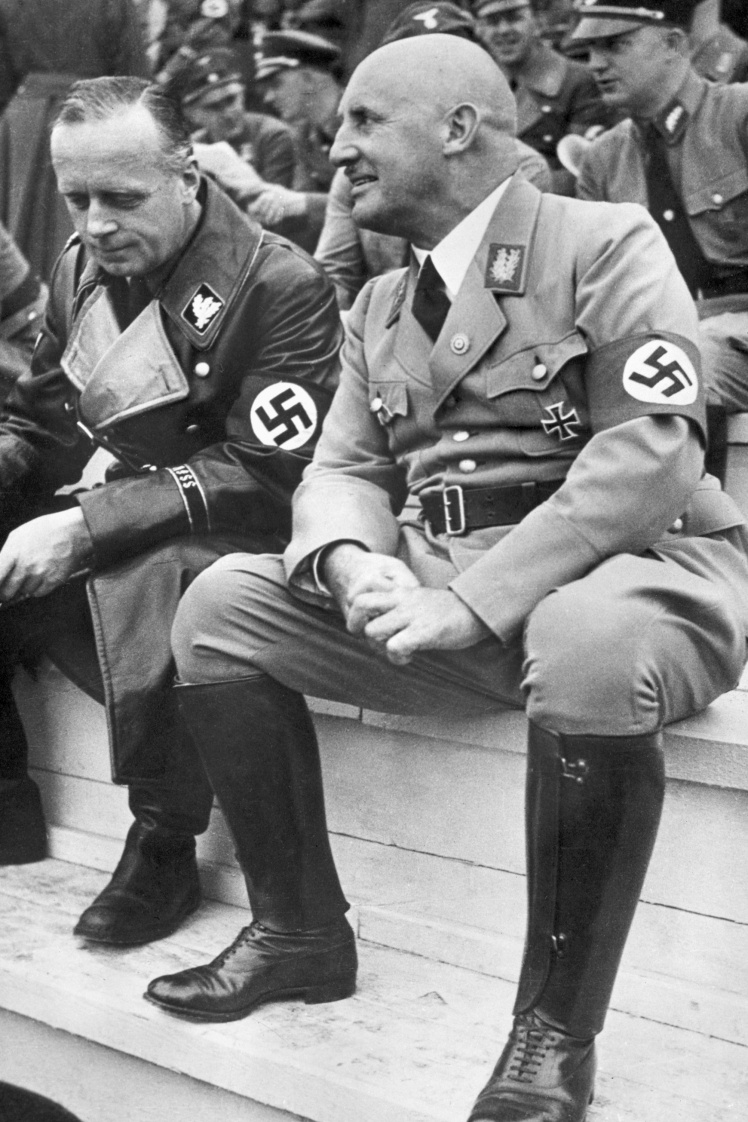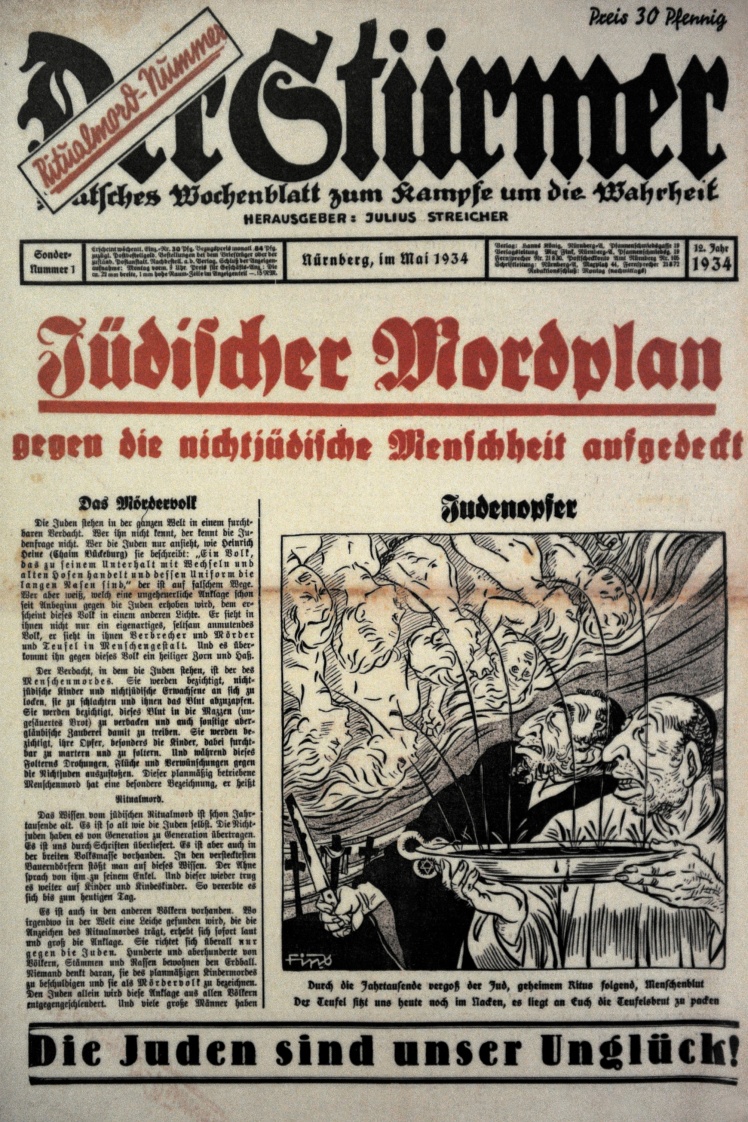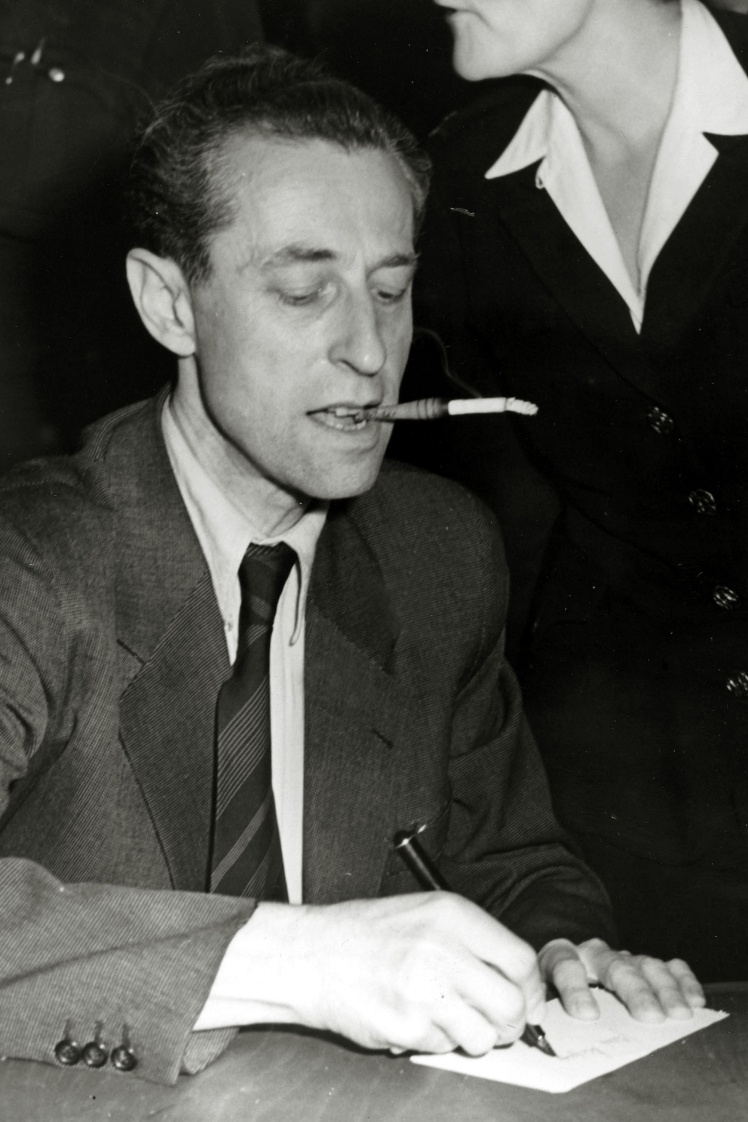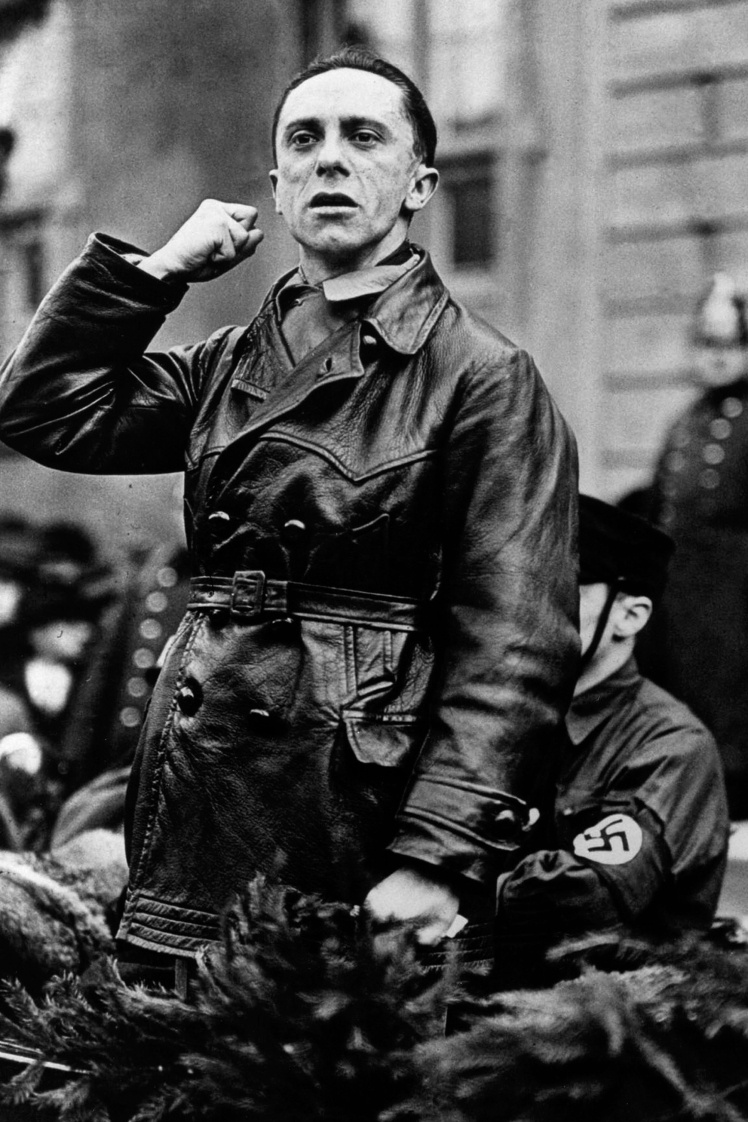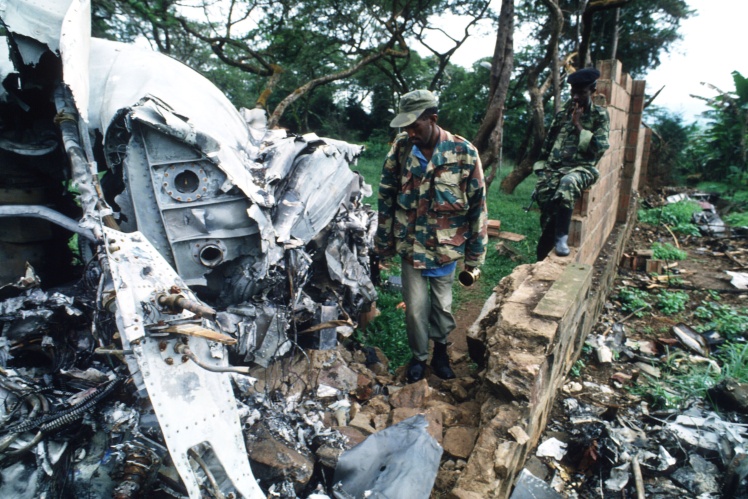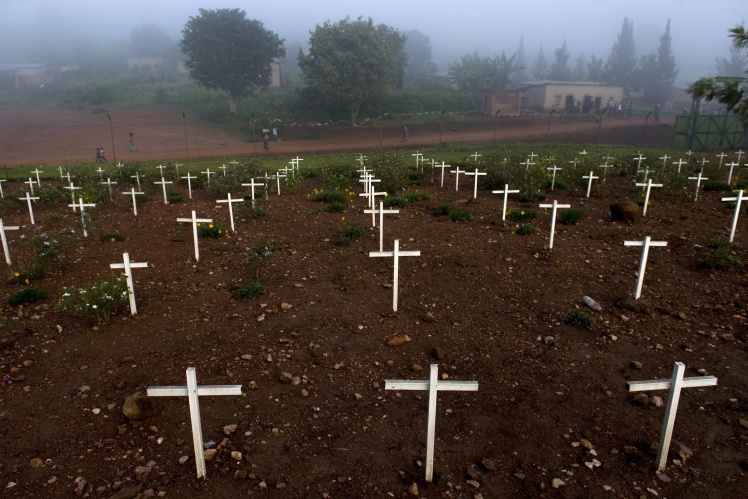The Second World War. Nuremberg
The Nuremberg trials tried cases against 24 high-ranking Nazis, but only two of them concerned propaganda. This is the accusation against the publisher of the newspaper Der Stürmer Julius Streicher and the radio host of the program Hans Fritsche Speaks Hans Fritsche. Both of them did not personally kill anyone, but played a key role in the construction of Nazi propaganda.
From 1932 to 1945, Julius Streicher was a member of the Nazi Party and editor-in-chief of the anti-Semitic newspaper Der Stürmer. For more than 20 years, this most successful newspaper of the Third Reich incited hatred against Jews by publishing crude articles and caricatures that portrayed Jews as inferior, greedy and sexually deviant. Streicher headed this newspaper from the first day. The tribunal found that he had played a leading role in the politics of the Holocaust, and found Streicher a crime against humanity. He was sentenced to death and hanged in October 1946.
Julius Streicher (right) with Third Reich Foreign Minister Ribbentrop A front page of Der Stürmer newspaper in 1934. One of the headlines reads: "Jews are our misfortune."
Getty Images / «Babel'»
Hans Fritsche was a member of the Nazi Party and editor-in-chief of the German official telegraph agency Deutsches Nachrichtenbüro, working in the Ministry of Propaganda headed by Joseph Goebbels from 1938 to 1945. He became the only one in the ministry who was in charge of radio broadcasting in 1942. At the tribunal, the prosecution claimed that Fritsche had committed crimes against peace and crimes against humanity. Fritsche admitted in his testimony that the German Press Department effectively ran all the dailies in Germany, giving them directives from the Ministry of Propaganda on what to publish. When Fritsche started managing the radio stations, he sent out directives for them as well.
But the tribunal acquitted Friche. Prosecutors explained that Fritsche did not write these directives himself, but only transmitted Goebbelsʼ instructions. He also never called for the extermination of the Jews, tried to ban the newspaper Der Stürmer and never personally spoke to Hitler. Fritsche was sentenced for other crimes that were considered by the denazification commission. The judges found that Fritscheʼs program was in line with Nazi ideology, and that its influence on society had greatly increased in 1942. Unlike the International Tribunal, the court saw anti-Semitic propaganda in Fricheʼs actions. He was recognized as "one of the most influential and active propagandists of Nazi ideology" and sentenced to 9 years in prison.
Hans Fritsche in October 1946 Joseph Goebbels, the Minister of Propaganda of Nazi Germany, one of the main ideologues of the Third Reich and the Holocaust.
Getty Images / «Babel'»
Genocide in Rwanda and the International Tribunal
The case against the Rwandan media has become the most revealing of all international tribunals. Prosecutors recognized the mass media as a tool of the crime. Itʼs about the newspaper "Kangura" and the private "Radio of a thousand hills".
“Kangura” newspaper was published in Rwanda from 1990 to 1994 and was headed by Hutu Hassan Ngeze. From the first day, the newspaper turned its readers against the Tutsi. It was there that the "10 commandments of the Hutu" appeared, which called for hatred of the Tutsis, especially women. Hutus who either married Tutsi or employed them were called traitors in the "commandments". Tutsis did not have the right to work in education, join the armed forces, hold strategic political or economic positions.
The issue of "Kangura" was published, which was later recognized as criminal, in 1991 (three years before the genocide). On the first column was a portrait of Grégoire Kayiband — the first president of Rwanda, who belonged to the Hutu and led the country as a result of the 1959 revolution. Under the portrait was the inscription "Letʼs repeat the Hutu revolution of 1959, so that we can defeat the Tutsi cockroaches?", and next to it was — "What weapon should we use to defeat the cockroaches once and for all?". A machete was depicted to the left of the portrait. The tribunal later noted that the material called for the destruction of the Tutsi as an ethnic group — that is, for genocide. "By instilling fear and promoting hatred, Kangura paved the way for the genocide in Rwanda, driving the Hutu population to a murderous frenzy," the verdict read.
The newspaper also published other articles and cartoons that incited hatred against the Tutsi. In particular, it led to mass sexual violence against Tutsi women. At the height of the genocide, the names and photos of those who should be considered enemies were published in the newspaper. Some of these materials were written by Hassan Ngeze himself, and during the preparation of these articles he worked closely with Ferdinand Nahimana and other ideologues of the Tutsi genocide.
Wikimedia
Ngeze was found guilty of crimes against humanity and sentenced to life in prison, but that sentence was later reduced to 35 years on appeal.
"Radio of a Thousand Hills". This is a private radio that was created in July 1993. For the sake of a better signal, it used the power of the state radio station "Radio Rwanda", which is why it became the main one in the country. The radio station quickly became popular because it broadcast quality music, later messages directed against the Tutsi began to appear in the breaks between songs. Tutsis were called "cockroaches" and "snakes". They were dehumanized for it would be easier to kill their former neighbors, friends, sometimes parents or wives.
When radical Hutus shot down the plane carrying President Juvenal Gabyarimana, the radio station announced on air: "Time to cut down the tall trees." It was a direct call to kill the Tutsi. They were called "tall trees" because the Tutsi were believed to be taller than the Hutu, and also to have thinner bones and lighter skin. Radio presenter Valerie Bemeriki, who was nicknamed the "Announcer of Evil", encouraged people to create roadblocks to effectively catch the Tutsis, saying that they should not be wasted with bullets, but should be cut to pieces with machetes. Groups of Hutu could be seen on the streets of Rwanda, holding machetes in one hand and a receiver broadcasting “Radio of a Thousand Hills” in the other, in April 1994. From the radio, they learned the addresses of houses where Tutsi lived or hid, went there and killed them. A professor at the University of Zurich and an economist David Yanagizawa-Drott proved that in those areas where the coverage of the radio station was better, many more people signed up for the Hutu punitive detachments.
A Rwandan soldier looks at the wreckage of the plane in which the countryʼs president Juvenal Gabyarimana was flying Memorial to the victims of genocide in Rwanda.
Getty Images / «Babel'»
The tribunal heard cases against key employees of the “Radio of a Thousand Hills”. A local Rwandan gakaka court sentenced Bemeriki to life imprisonment for inciting genocide. The co-founder of the radio station and Rwandan historian Ferdinand Nachiman was sentenced to 30 years in prison. Belgian journalist Georges Rougeau of the "Radio of a Thousand Hills" was sentenced to 12 years in prison — the sentence was commuted because he cooperated with the investigation. The director of the radio station Felicien Kabugu hid from the court for 28 years. However, he was arrested in May 2020. His trial began in September 2022, and there is no verdict yet.
The war in Yugoslavia and the International Tribunal
The International Tribunal for Yugoslavia issued only one sentence for propaganda of hatred. It was awarded to the Serbian politician Vojislav Šešelj, who was the Deputy Prime Minister of Serbia during Slobodan Milosevicʼs time. Šešelj was in favor of a "Great Serbia" and a mono-ethnic country, he considered Bosnians to be bad and "dirty Muslims". During the Bitka za Vukovar, he urged Serbian soldiers not to let any Croatian fighter "leave alive" from the city. The prosecutorʼs office claimed that Šešeljʼs speeches directly incited murders and ethnic cleansing.
Šešelj spoke at a rally in support of the Serbian Radical Party, to which he belonged, in 1992, in Hrtkivci (the Serbian region of Vojvodine). The whole speech was about the Croats. He addressed his "Serbian brothers and sisters", declaring that "Croats have no place in Hrtkivci" and that "we will drive them out" to the border with Serbian territory. Šešelj ended his speech as follows: "I firmly believe that you, Serbs from Hrtkivci and the surrounding villages, also know that for the sake of your harmony and unity, you must get rid of the Croats who remained in your and neighboring villages." After his speech, people shouted: "Croats, go to Croatia! This is Serbia."
Vukovar after the siege.
Getty Images / «Babel'»
Also about the war in Yugoslavia:
- ”Judge Putin according to Ukrainian laws, otherwise the process may drag on forever.” Former accuser of Slobodan Milosevic, British lawyer Geoffrey Nice — on a fair trial of the President of Russia
- Serbs and Albanians have been killing each other for centuries in Kosovo, recently the war almost broke out again. We tell the story of the conflict and the independence of Kosovo, which has no resemblance with “D/LPR”
- ”If we had ratified the Rome Statute, the International Criminal Court would have already formulated an indictment against Putin.” Interview with ex-judge of the Tribunal for the former Yugoslavia Volodymyr Vasylenko
- The Serbs shelled Sarajevo for almost four years. Bosniaks hid from snipersʼ shells and bullets, resisted, and waited for NATOʼs help. This is how it was
The court did not immediately find Šešelj guilty, but the prosecutors filed an appeal and Šešelj was still convicted for the speech in Hrtkivci. The tribunal proved that after it, the Serbs began to persecute other ethnic groups, in particular the Croats. They were regularly threatened and forced to leave Hrtkivci. According to the court, the population of ethnic Croats in Hrtkivci decreased by 76.3%. Šešelj was sentenced to 10 years in prison. Since the trial lasted for a very long time and he was under arrest for 12 years, these years were credited to the term and he was released.
Russiaʼs aggression against Ukraine and future trials
Anti-Ukrainian and anti-Western propaganda has been heard in the Russian media since 2004. The failure of Viktor Yanukovych, who was supported by Putin, and the Orange Revolution launched several narratives, including “a bad West that orchestrates "color" revolutions in post-Soviet countries”. Ukrainians who protested on the Maidan against election falsification were humiliating called "Poisoned by Maidan". After the Revolution of Dignity in 2014, this word was constantly heard on federal channels.
Propaganda actively used the victory of Euromaidan, the annexation of Crimea, the protests in the east of Ukraine (which were provoked by Russia) and the subsequent anti-terrorist operation of Ukrainian troops. Russian media claimed that there was a coup in Ukraine;"Right Sector" is going to Crimea to kill Crimeans; Ukrainian military is torturing people in Donetsk and Luhansk regions; "Nazis burned people alive"in Odesa on May 2, 2014, setting up "Odesa Khatyn". This strongly influenced the dehumanization of Ukrainians — even Russian propagandists admitted that thanks to the myth of the "Odesa Khatyn", the units of fighters of the self-proclaimed "L/DPR" were significantly replenished with volunteers.
Protests on Hrushevsky Street in Kyiv in January 2014.
Getty Images / «Babel'»
After the full-scale invasion, the rhetoric of the Russian mass media was reduced to "the final solution of the Ukrainian question". Ukrainian law enforcement agencies are studying the activities of some Russian propagandists and suspect them of committing both international crimes and crimes against the territorial integrity of Ukraine. Here are some examples.
Back in 2018, journalist and employee of the propaganda news agency "Russia Today" Armen Gasparyan published an anti-Ukrainian book in which he used the term "denazification" in relation to Ukraine. Later, Putin would use it to explain his attack on Ukraine. In this book, Gasparyan wrote about the "failure of the formation of the Ukrainian state" and called on the Russian leadership to go to war against Ukraine. Ukrainian law enforcement agencies saw in his statements calls for genocide, as well as actions "for violent change and overthrow of the constitutional order and encroachment on the territorial integrity and inviolability of Ukraine." A court hearing in this case has already been scheduled for October 18 in one of the Kyiv courts.
A political technologist and one of the ideologues of the war Tymofii Sergeitsev has been working in the state propaganda agency “RIA Novosti” [“RIA News”] since 2014. In April 2014, when there were fears that Putin would attack Ukraine, he accused Ukrainians of racial discrimination against other peoples and compared it to the actions of the Nazis in Germany. He also used the word "denazification" — the destruction of Ukrainian culture, language, etc.
In April 2022, Sergeitsev called for the destruction of the Ukrainian military, and accused Ukrainians of the genocide of the "Russian people" invented by Russian propaganda. He called almost all Ukrainians "helpers of the Nazis" who should receive death sentences or sit in prison. He also wrote that Ukraine cannot be sovereign and should not exist at all. This text has been read by more than 1.5 million people.
In response to this article, Bundestag deputy Toma Heilman filed a statement with the Berlin Prosecutorʼs Office and accused Sergeitsev of inciting genocide. Prominent American historian Timothy Snyder called the article by Timofey Sergeitsev "a Russian guide to genocide." The Ukrainian President Volodymyr Zelensky called it one of the "evidence for the future tribunal on Russian war crimes."
Timothy Snyder
Getty Images / «Babel'»
Ukrainian prosecutors declared Sergeitsev the suspicion in May. He is charged with calls for genocide, actions for violent change and overthrow of the constitutional order, as well as encroachment on the territorial integrity and inviolability of Ukraine. The indictment is already in court.
Olga Skabeeva, Dmytro Kiselyov and Volodymyr Solovyov have been conducting propaganda against Ukraine for many years. Shortly before February 24, Skabeeva and Solovyov discussed that Russia would need three to four days to seize Ukraine. During the war, Skabeeva declared that Russia should take revenge on Ukraine, that Putinʼs "operation" should be brought to an end. She also published a photo of Zhyrynovskyi cutting a cake in the shape of Ukraine on her “Telegram” channel with the caption "Letʼs cut it again." Skabeeva and Kiselyov were charged with encroaching on the territorial integrity and inviolability of Ukraine. Solovyov was declared the suspicion in public calls to change the state border of Ukraine, which led to the death of people. He also was declared wanted.
Margarita Simonyan is the editor-in-chief of the Russia Today news agency, the head of the Russia Today TV channel. In February 2022, after the full-scale Russian invasion of Ukraine, the European Union imposed sanctions against Simonyan and called her a "central figure" of Russian propaganda. She publicly called on the Russian authorities to annex the territories of Ukraine, assured that Russia would capture Ukraine in two days. Since September, Simonyan has been calling for the bombing of Ukraineʼs critical infrastructure, promoting the idea that the Russian atrocities in Bucha are "Ukrainiansʼ fictions". In March, the Prosecutor Generalʼs Office declared Simonyan the suspicion because of her statements.
Margarita Simonyan receives the Order of Alexander Nevsky from Vladimir Putin in 2019.
Getty Images / «Babel'»
Another employee of Russia Today, Anton Krasovsky. He is one of the main anti-Ukrainian propagandists of the channel. He claimed that Ukraine would not join NATO because "this is our [Russian] land," and said that he would "burn the Ukrainian Constitution on Khreshchatyk Street." In one of his broadcasts, he called for the extermination of Ukrainians: "Guys, itʼs obvious that you need to pull yourself together. Get together. Stop thinking about "brothers". They are not our brothers. I grew up there, I speak with knowledge. Kill! Letʼs go! Enough!". In his Telegram channel, he also wrote: "All this once again proves that there can be no Ukraine. None! Nowhere! From Uzhhorod to Kharkiv, everything should become Russia." This post has been read by at least 93 000 people. The Security Service of Ukraine declared Krasovsky the suspicion and submitted the case materials to the court. He is accused of genocide, public calls for genocide and dissemination of relevant materials.
On February 26, 2022, Russian propagandist Petr Akopov published a column in the propagandist RIA Novosti called "The Oncoming of Russia and the New World." There, Akopov speculated about what would happen to Ukraine after the success of the Russian "military special operation". Akopov wrote about the success as a fact in the past tense. Obviously, the column was written in advance, with the certainty that Russia would quickly seize Ukraine. But since this did not happen, the column was removed from the site on the same day. It was in this column that Akopov used the term "resolution of the Ukrainian question": "Vladimir Putin took on historical responsibility, deciding not to leave the solution of the Ukrainian question to future generations."
Is it possible to punish Russian propagandists?
It is possible, but it is a complicated process. This is evident even from past tribunals, where cases against propagandists were in the absolute minority.
According to International Bar Association Executive Director Mark Ellis, only propaganda or hate speech that calls for criminal actions: aggression, deportation, murder, genocide can be considered a crime. That is, only those Russian propagandists who incited the genocide of Ukrainians can end up in the International Criminal Court.
As former Prosecutor General Gunduz Mammadov explained to “Babel”, the call to genocide is difficult to prove. It is necessary to prove that there was an intention to commit genocide. Not all statements of propagandists can be interpreted in this way by the court. It is necessary to conduct a number of examinations and establish the consequences, that is, whether specific words led to international crimes: murders, torture, deportations. Therefore, this process is also very long in time.
However, propagandists can be tried not only for inciting genocide. Mammadov says that their actions can be qualified as war propaganda. Such a crime is prescribed in the Criminal Code of Ukraine. And then everything will depend on the progress of the investigation and coordination of Ukrainian courts and the International Criminal Court.
Punishment will find every propagandist, no matter how much time passes, and "Babel" will write about it. Your donation will give us the strength to survive: 🔸 in hryvnia , 🔸 in cryptocurrency , 🔸 Patreon , 🔸 PayPal: [email protected].
Graves of victims of the Russian-Ukrainian war in Irpin.
Getty Images / «Babel'»

